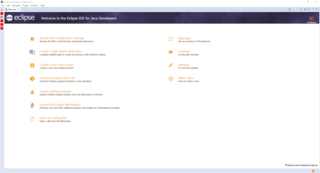This article is being considered for deletion in accordance with Wikipedia's deletion policy. |
This article has multiple issues. Please help improve it or discuss these issues on the talk page . (Learn how and when to remove these template messages) (Learn how and when to remove this template message)
|
Type of site | free open source project hosting site |
|---|---|
| Owner | Intland Software |
| Created by | Intland Software |
| Website | www |
| Alexa rank | |
| Commercial | Yes |
| Registration | optional |
| Launched | September 2005 |
| Current status | Inactive |
JavaForge.com was a non-profit and free open source software development community with a hosting portal for open source projects. It hosted software development services such as Project related web hosting, document management, wiki, forum, online chat, issue tracking integrated with optional Git, Mercurial or Subversion revision control.
Software development is the process of conceiving, specifying, designing, programming, documenting, testing, and bug fixing involved in creating and maintaining applications, frameworks, or other software components. Software development is a process of writing and maintaining the source code, but in a broader sense, it includes all that is involved between the conception of the desired software through to the final manifestation of the software, sometimes in a planned and structured process. Therefore, software development may include research, new development, prototyping, modification, reuse, re-engineering, maintenance, or any other activities that result in software products.
A document management system (DMS) is a system used to track, manage and store documents and reduce paper. Most are capable of keeping a record of the various versions created and modified by different users. The term has some overlap with the concepts of content management systems. It is often viewed as a component of enterprise content management (ECM) systems and related to digital asset management, document imaging, workflow systems and records management systems.

A wiki is a knowledge base website on which users collaboratively modify content and structure directly from the web browser. In a typical wiki, text is written using a simplified markup language and often edited with the help of a rich-text editor.
Contents
The technology behind JavaForge was codeBeamer, an Application Lifecycle Management platform with integrated Requirements management, Demand Management, Development & Project Management, QA-Test Management and IT Operations (DevOps) modules. At its height, JavaForge [2] hosted more than 88,000 users. [3]
Requirements management is the process of documenting, analyzing, tracing, prioritizing and agreeing on requirements and then controlling change and communicating to relevant stakeholders. It is a continuous process throughout a project. A requirement is a capability to which a project outcome should conform.
DevOps is a set of software development practices that combines software development (Dev) and information technology operations (Ops) to shorten the systems development life cycle while delivering features, fixes, and updates frequently in close alignment with business objectives.







